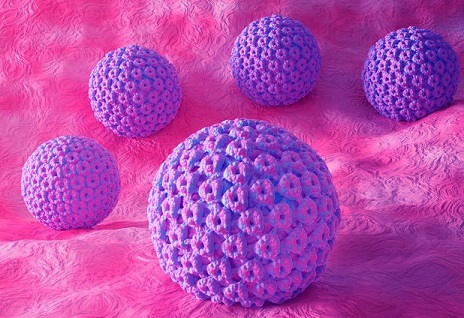Nikhil Prasad Fact checked by:Thailand Medical News Team Nov 11, 2024 1 year, 2 months, 1 week, 2 days, 4 hours, 38 minutes ago
Herbs And Phytochemicals: Human Papillomavirus (HPV), the world’s most common sexually transmitted infection, has long been linked to cancers such as cervical, vulvar, and throat cancer. Scientists are exploring natural compounds, or phytopharmaceuticals, to counteract the dangerous effects of HPV proteins that alter normal cell processes, leading to cancerous changes. These compounds, extracted from plants, hold promise as therapeutic agents by specifically targeting HPV-related proteins and disrupting harmful cellular processes that the virus relies on for survival.
 Natural Compounds as Hope for Reducing HPV-Related Cancers
Natural Compounds as Hope for Reducing HPV-Related Cancers
In this
Herbs And Phytochemicals news report, we will examine findings on natural compounds that focus on redox states in cells, a balance that HPV often disrupts to fuel its progression. High levels of reactive oxygen species (ROS) generated by HPV create oxidative stress (OS) in cells, leading to DNA damage and cellular transformation. Such findings suggest that certain natural compounds can counteract these effects, ultimately leading to cell death in HPV-related cancers.
The Role of Redox Balance in HPV Cancer Development
A healthy cell maintains a balance between ROS and antioxidants, which is crucial for normal cell function. HPV proteins disrupt this balance by inducing oxidative stress, damaging DNA, proteins, and lipids. The damage accumulates over time, increasing the likelihood of cancer. Additionally, this imbalance helps HPV evade the immune system and promotes its integration into the host cell’s DNA. For example, HPV E6 and E7 proteins have been shown to interact with critical cellular regulators like p53, a major tumor suppressor, and induce processes that keep infected cells from dying, allowing them to proliferate unchecked.
HPV’s disruption of cellular metabolism and redox state offers a potential target for treatments. Researchers are exploring phytopharmaceuticals that can induce oxidative stress selectively in HPV-infected cells, tipping the scale back towards cell death rather than transformation.
Key Phytopharmaceuticals Targeting HPV-Related Proteins
Several plant-derived compounds have shown promise in targeting HPV proteins, such as E6 and E7, which interfere with crucial cell functions. The compounds discussed here inhibit these proteins or disrupt cellular redox balances that HPV manipulates for survival.
-Pinellia Pedatisecta Extract
The rhizome of Pinellia pedatisecta, a plant used in traditional medicine, was studied for its effects on cervical cancer cells infected with HPV. The extract (PE) inhibited growth specifically in HPV-positive cervical cancer cells while sparing healthy cells. PE reduced E6 expression and reactivated p53, promoting apoptosis or programmed cell death in these cancer cells.
-Boswellia-Derived Compound BCDD
Another promising compound, 2-cyano-3,11-dioxide-1,12-dien-24-oate butyl (BCDD), derived
from Boswellia plants, also targets the E6 protein. This compound increases the activity of proteins that trigger apoptosis and reduces the activity of survival pathways that HPV-positive cells rely on.
-Green Tea Extract Epigallocatechin-3-gallate (EGCG)
EGCG, a green tea compound, has a long history of health benefits. Studies show that EGCG can arrest the cell cycle and initiate apoptosis in HPV-positive cervical cancer cells. Additionally, it inhibits estrogen receptor expression, which is relevant because estrogen has been linked to HPV-positive cervical cancers. Early trials on patients suggest EGCG could be used to clear HPV infections.
-Quercetin and Docosahexaenoic Acid (DHA)
Quercetin and DHA, a polyphenol and an omega-3 fatty acid, respectively, show potential in activating the ubiquitination-proteasome system (UPS), leading to degradation of the E6 and E7 proteins and, consequently, apoptosis in HPV-infected cells.
-Amentoflavone from Selaginella Tamariscina
Amentoflavone, a biflavonoid, interferes with the E7 protein, another critical protein for HPV cancer development. In cervical cancer cells, amentoflavone increases the expression of proteins that induce apoptosis and decreases the expression of those that inhibit it. This dual action can effectively initiate cell death in HPV-positive cells.
Mechanisms of Action in Phytopharmaceuticals
Natural compounds work in several ways to target HPV-infected cells. Many focus on the redox state by either directly increasing ROS levels to induce cell death or by inhibiting antioxidant defenses in HPV-positive cells. For instance, compounds like PE and BCDD specifically lower the expression of HPV oncoproteins and restore cellular mechanisms that allow the cell to recognize the infected cells as abnormal, leading to programmed cell death.
Another key mechanism involves modulating the redox state through mitochondria. When HPV proteins interfere with mitochondrial function, they promote oxidative stress, which these natural compounds counteract by restoring the redox state, tipping the balance back towards cell death instead of cellular transformation.
Conclusion: A New Avenue for HPV Treatment
Research on phytopharmaceuticals offers promising directions for developing targeted HPV therapies that induce apoptosis specifically in infected cells. By focusing on HPV proteins and cellular redox states, these compounds open possibilities for treating HPV-related cancers without affecting healthy cells. The advantages of phytopharmaceuticals lie in their selective action and potential to offer alternative or complementary therapies for HPV-related cancers that are otherwise difficult to manage.
As research continues, these compounds could transform HPV treatment by harnessing the therapeutic power of plants to fight one of the most pervasive causes of cancer.
The study findings were published in the peer-reviewed journal: Future Pharmacology.
https://www.mdpi.com/2673-9879/4/4/38
For the latest on
Herbs And Phytochemicals, keep on logging to Thailand Medical News.
Read Also:
https://www.thailandmedical.news/news/thailand-medical-researchers-discover-that-ellagic-acid-can-help-against-hpv-infections-in-women
https://www.thailandmedical.news/news/combination-of-four-natural-supplements-can-tackle-persistent-hpv-infections
